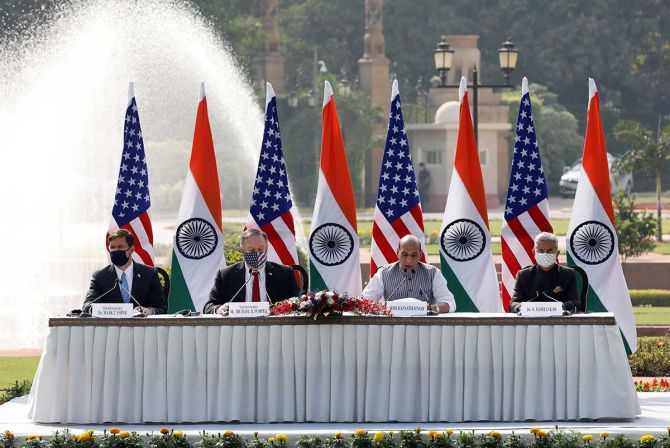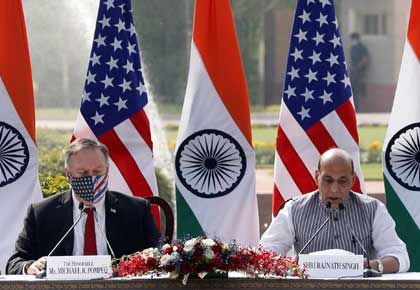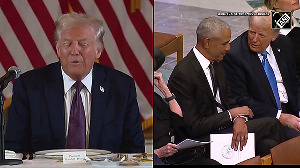'Analysts see BECA as a 'force multiplier' for India.'
'But China too is known to have such capabilities.'
'The military gap with China will continue to remain a fact of life, BECA notwithstanding,' argues Ambassador M K Bhadrakumar.

The '2+2' Ministerial Dialogue (external link) with the United States has ended leaving a trail of uncertainties.
In substantive terms, there has been no real outcome.
Words, words -- that's all we have, words that take the breath away.
The wordplay apart, there's nothing to write home about by way of tangible results.
The joint statement (external link) issued after the 2+2 is more in the nature of a tour d'horizon.
One striking addition appears to be the reference to a new US-Indian Health Dialogue.
It is a welcome addition.
The US and India are neck and neck as the worst affected countries in the global pandemic and they can bring a wealth of experience, good and bad, to the table.
The sooner the Health Dialogue begins, the better.
If the US can help India build up a modern public health infrastructure out of its decrepit system today, hundreds of millions of Indians will be eternally grateful.
When the Bill Clinton administration took renewed interest in India in the second half of the 1990s, there were high hopes that the new relationship would qualitatively help India's renaissance in the social sectors.
But alas, as years passed, the emphasis shifted to military affairs, and vendors of weaponry peddling their wares and their middlemen and lobbyists took over centerstage and the clamour of 'interoperability' became deafening.
Under Donald Trump, what little was left of the humanistic content also got drained out.
Today, of course, China's rise has become a common eyesore for the two countries, and provides a leitmotif to the relationship.
Therefore, the scheduling of the '2+2' just a week ahead of the US election on November 3 remains an enigma.
The US is caught in a tumultuous political transition, and no matter who wins the election, American policies will change.
And to try to anchor the US-Indian relationship amidst the torrential flow of American politics belies logic.
Yet, the '2+2' was scheduled.
The standoff in eastern Ladakh is almost six months old.
But by getting US Secretary of State Mike Pompeo over to Delhi, we cannot hope to unnerve the Chinese who don't take him seriously.
Pompeo is to the Chinese more of a troll indulging in role-playing games on toy store shelves than a centaur who must be driven away.
Therefore, the conclusion can only be that, perhaps, we were obliged to arrange a moveable feast for him -- one last diplomatic waltz -- so that the BECA could be signed, which is mandatory for the Pentagon to share with partners classified military information, military facilities, highly sensitive communication equipment and geospatial maps.
No doubt, geospatial intelligence and real-time images are useful for the Indian forces in their standoff with China as winter sets in and Chinese intentions need to be constantly evaluated.
Any postponement of the BECA beyond November 3 would have carried the risk of delaying it until the new administration settles in, which could take months.
Analysts see the BECA as a 'force multiplier' for India\which is significantly inferior to China in military capability.
Will it be a 'game-changer'?
But China too is known to have such capabilities.
Suffice to say, the military gap with China will continue to remain a fact of life, BECA notwithstanding.
Again, the coordinates or inputs that BECA provides may not be useful beyond a point in their application, since something like seventy percent of Indian weapons are of Russian origin, which may be incompatible with the US services.
Most certainly, the US will also gain insights into Indian defence capabilities -- and even be in a position to manipulate our deficiencies, if need arises.
The US is the uncrowned king of cyber crime not only on this planet, but also in space.
Anyone who is curious to know how such things happen would need only to read up Edward Snowden's memoirs Permanent Record.
Russia would have misgivings while transferring cutting-edge military technology to India in future.
Again, India might be obliged to share with the US the downstream data and intelligence on China, which becomes inputs for America's Five Eyes alliance with the Anglo-Saxon countries.
With the signing of the BECA, India has signed the last of the four foundational agreements, which the US sets as the bar for any country to qualify as its de facto ally.
Put differently, India's membership of BRICS and SCO loses traction.
The international perception will be that a US-Indian military alliance is appearing in the geopolitics of the region.
That is bound to generate disappointment and wariness amongst many of India's traditional friends and neighbours, affecting their attitude toward us.
Realignments in regional politics may ensue.
Meanwhile, the US visualises that India "may become one of the most consequential partnerships of the 21st century" -- to borrow the words of US Defence Secretary Mark Esper.
Indeed, BECA will constantly remind India of the imperatives of 'interoperability', which demands that India, like the US' allies, also switches to US weaponry.
'Interoperability' will necessitate that India progressively whittles down dependence on Russian weaponry.
Make no mistake, the US has politico-military instruments at its disposal to ensure India's compliance, especially once the 'time-tested' Indo-Russian axis significantly atrophies.
The point is, 'interoperability"'enables the US to expand the domestic industrial base of its arms industry, aside denying market space to Russia.
These are core objectives spelt out in the US National Security Strategy.
Esper forcefully stated last week that 'we (the US) must compete with China and Russia, whose State-owned industries can fast track military exports in ways that we cannot..'
'As Beijing and Moscow work to expand their share of the world's weapons market, they attract other countries into their security networks, challenge the United States's efforts to cultivate relationships, and complicate the future operating environment at the same time.'
'In light of these challenges, we set out to reform our approach to make the United States more competitive in the global marketplace and to strengthen our cooperation with allies and partners.'
The US is desperately short of Asian partners willing to join its anti-China front.
It senses that India under Modi 2.0 may be abandon its traditional diplomatic principles of non-alignment and move closer to America.
Suffice to say, the reach of the '2+2' goes beyond the BECA.
However, once the election cycle is over, the next US administration is almost certain to consign Pompeo's bombastic rhetoric to the attic.
What happens then?
China's existence across the Himalayas will still remain a compelling reality for India.
The bilateral engagement with China will still be of crucial importance.
Ambassador M K Bhadrakumar served the Indian Foreign Service for more than 29 years.
He is a frequent contributor to Rediff.com.
Feature Presentation: Ashish Narsale/Rediff.com











 © 2025
© 2025